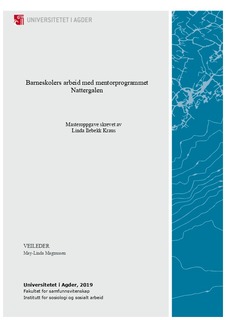| dc.description.abstract | In this master's thesis,I use institutional ethnography as a method for examining how the Nightingale mentor program is being worked within selected primary schools. The program was initiated by the Stoltenberg II government, and the program is primarily aimed at studentswhostudysocial work, as well as school children aged 8-12, preferably children with ethnic minority backgrounds. A total of eight universities and colleges around Norway are involved in the project, as well as several primary schools. Students will be a mentor for achild throughout a school year, and together they will dodifferent activities. The most important datain the thesis is qualitative interviews that have been conducted with people who work in primary schools and who have a connection to the Nightingalementor program. I interviewed two principals and three people who are environmental therapists or social teachers.My approach has revealed slightly different findings than the previous evaluation reports (Bakketeig, Backe-Hansen, Seeberg, Solberg & Patras, 2011; Jessen, Gundersen & Hynek, 2018) of the Nightingale has presented.My main findings arethat the Nightingale, over time, seems to havebeen integrated into the work that the contact persons I have interviewed otherwisedo in the primary schools. The people who work with the Nightingale in the primary schoolshave gotten accustomedto the work, and it isdescribed as very positive work. Nevertheless, it is work that requires them to build relationships and create trust with the parents of the children who will participate. It also requires a lot of effort to secure the parents that the Nightingale is a safe and positive measure. When my informantsrecruit children to participate in the Nightingale, it is often children «at risk»and children who do not have what the school defines as «organized leisure activities», whobecome relevant participants. Children who do not participate in organized leisure activities are referred to as children who are «not integrated»into Norwegian society. This seems to be some dominant or ruling relations in the work of the Nightingale.Finally, in the thesis, I argue that setting ethnic background as a criterion for participation in the Nightingale is unfortunate, because it maintains a mindset of ethnicity as somethingthat always separates people substantially from each other. This division can create envy for those children who are not allowed to participate in the Nightingale, and this can lead to prejudice against ethnic minorities. Another reason not to divide by ethnicity may be that it can help build bridges across ethnic groups. At the end of the assignment I come up with suggestions for further research. | nb_NO |

